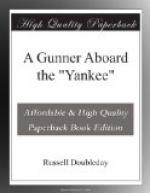The man on the port end of the bridge whom I relieved, shouted in my ear—he could not be heard otherwise—“You want to get a good hold or you’ll be fired overboard in a jiffy.” Then he left me.
It was the kind of a night one felt the need of companionship. I spent a lonely hour on the bridge, eyes and ears strained for signs of other vessels, face and hands stung by the pelting rain. Underlying all other thoughts was the consciousness that we carried several hundred tons of deadly explosive that might shift any moment or be ignited by a spark from a lamp and explode.
The sandbags stored about the steering gear broke loose and were heaped in picturesque confusion. The scene aft was indescribable. A quantity of debris of varying nature slid across the smooth surface of the gun deck with a rush at every roll, making navigation a difficult, if not perilous, task. Later, to add to the tumult, one man’s hammock was cut down by a falling mess table, but he escaped serious injury.
It was not until the following morning that the seas subsided, but the day proved pleasant, and the mishaps of the preceding afternoon were forgotten in the excitement of reaching Norfolk, which port was reached by the “Yankee” shortly before dark. Later in the evening the ship was taken to the navy yard.
“Which means that we are going to hustle more ammunition,” observed Tommy, as we made fast to a dock.
“And more stores,” added “Dye.”
“And coal,” chimed in “Stump,” with a grimace. “I am glad of it, too.”
“Glad of it?” echoed “Dye,” in surprise. “That’s queer.”
“Not at all, dear boy,” was the second loader’s calm reply. “D’ye see, I am in training for the billet of chief deck hand on a tramp canal boat, and this experience is just in my line.”
Four days later the mooring hawsers were cast off and the “Yankee” steamed out between the capes en route to Santiago. From the hour we left Norfolk until the sighting of the Cuban coast, our time was taken up with drills of every description. The following extract from the log for July 18th, will suffice for an example:
“Cleared ship for action at three bells along with general quarters. General quarters again half an hour after turn to at noon. Fire drill and abandon ship at three bells in the afternoon. General quarters again at two bells (9 p.m.).”
Under date of July 19th, one of the crew states in his private diary: “Clear ship for action again. This is a very pretty drill, and is much liked by the boys, as it includes sending all the mess gear and provisions below, where most of them are usually ‘pinched.’ Clear ship for action always means an exchange of undesirable mess gear, such as broken benches, tables, etc. General quarters at 1:30; fired two shots at an invisible target with smokeless powder. Great success, this new powder. If we had only been provided with it before, every living Spaniard would have trembled at the word ’Yankee’!”




